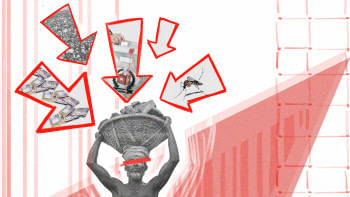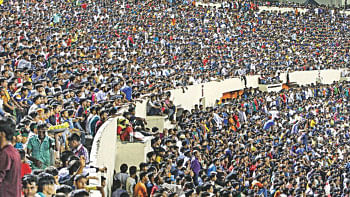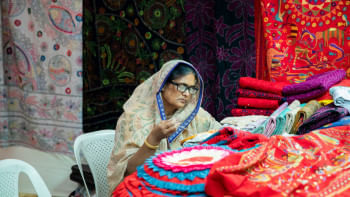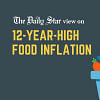Is Bangladesh at a triple crossroad?

Bangladesh has always battled and progressed through crises. But what future awaits us? The unknowns so outweigh the knowns. Familiar understandings have been upended. Political stability feels like political paralysis. Urgency for political renewal appears to be replacing the prognosis of political inevitability in the national mood. On the economic front, nervousness beneath the surface appears to have infected the dominant gung-ho megaproject mindset within the government even as the distance between rose-tinted ruling group narratives and the real economy grows evermore stark. "Development" is spawning dramatically contrasting faces – relentless cost-of-living despair for the common millions and corrupt accumulation for few at home and abroad at unprecedented scale. Meanwhile, the politico-developmental calendar ticks on – SDGs in seven years, demographic dividend in 10 years, LDC graduation in three and a half years.
Is the credible sense of mission and demonstration of competence in place to realise these goals? Can the current arrogant-through-lack-of-accountability mindset and the sycophancy-driven governing culture deliver? After all, these milestones do not just fall in the category of "just a little more" on a business-as-usual scenario. A qualitatively different level of driving is clearly called for. Yet, what we see instead is an ostrich-in-the-sand attitude of the ruling group which gives rise to a complacent reading of the situation requiring nothing more than a tweak here and a tweak there, overlaid with make-believe sloganeering. Meanwhile, sycophants of all shades are busy scrambling to update their defensive "talking points" as political calculations undergo rapid and bewildering shifts.
Bangladesh is in a moment where Nobel-winning poet WB Yeats' dramatic imagery in The Second Coming has never felt more visceral: "Things fall apart; the centre cannot hold... The ceremony of innocence is drowned… The best lack all conviction, while the worst are full of passionate intensity." The issue, however, is not just a crisis. Bangladesh is truly at a crossroad. Not just one, but a triple crossroad spanning political transition, economic trajectory, and the least in focus, educational future.
Politics, economic outcomes and educational futures have become frighteningly intertwined to the detriment of the common masses. Such intertwining, to an extent, has always marked Bangladesh's development journey. But over the preceding decade in particular, such tendencies have morphed into an entrenched "politico-development" model that is imperilling Bangladesh's inclusive, sustainable and justice-defined development aspirations. With a possible political transition looming, Bangladesh may thus truly be at an inflection point in its politico-development journey.
Four disquieting features cloud our future and call for a path-altering resetting of national strategy and a political renewal that decisively breaks with the entrenched "politico-development" model. The first question that needs asking is where the benefits of economic growth have gone over the last decade. Statistics are clear. These benefits have not primarily gone to the working majority and not even to the bulk of the middle class. Gini coefficient of inequality has risen from 0.458 in 2010 to 0.499 in 2022. Urban female employment declined from 4.6 million in 2016-17 to four million in 2022. Youth's economic standing as captured in the NEET ratio – youth neither in employment, education or training – has risen above one-third of youth population. Instead of a deeper structural transformation of the economy, both industrial and service sector employment declined between 2016-17 and 2022 – from 20.4 percent and 39.0 percent to 17.02 percent and 37.65 percent, respectively. Agriculture absorbed the bulk of new employment even while its GDP contribution stood at 11.22 percent, raising a puzzle on productivity trends. Informalisation of employment, too, has increased while a sizeable share of formal employment is availed by persons outside of Bangladesh, leading to remittance outflow from a country that's critically dependent on remittance itself.
There is little to take comfort from the reduction in poverty rates too, because Covid impact has exposed the vulnerabilities above the poverty line – the "new poor" first brought into spotlight in the PPRC-BIGD panel surveys in 2020-22. The relentless cost-of-living crisis battering the poor and middle classes alike exacerbates this phenomenon of the new poor and shows signs of worsening, rather than improving.
Economic governance over the preceding decade has clearly not been focused on majority welfare, nor on a sustainable and structural transformation of the economy. Instead, a vicious cycle of three politico-developmental tendencies – corrupt rule-making, profligate public expenditure, and institutionalised corruption across the board – have earned Bangladesh the dubious distinction of one of the fastest growth of uber-rich, not primarily through hard entrepreneurial labour but instead through corrupt "contact and contracts" on mega-scales. Finance, energy, infrastructure, ICT – key pillars of sustainable, inclusive and transformational development – have become beholden to narrow and entrenched vested group interests, imperilling sustainable development in general, while empowering unprecedented corrupt accumulation and capital flight.
The consequence of the politico-developmental model entrenched over the preceding decade and a half has seriously eroded the competitiveness of the economy and left both the "good entrepreneur" and the inflation-battered working majority adrift in a world of deepening uncertainty. And yet, the policy process continues to be in the grip of the vested groups.
The second disquieting feature of the preceding decade has been the state of educational governance. In a recent multi-stakeholder workshop in a northern district, the reality check was particularly disturbing on the ground realities of education. Schools and colleges are no longer happy places that are able to keep students sufficiently engaged in the classrooms. Tughloki decisions from above about curriculum changes without sufficient teacher training and sudden impositions of exam/semester timings, extreme politicisation of management committees, little or no meaningful extracurricular opportunities except on paper, unwritten directive for "easy grading" making high pass rates, etc are the main focus. The innate drive and aspirations of our youth are so poorly being served by this state of education. Such ground realities give the lie to all the airy talk of demographic dividend. Today's youth deserve better. Much better. Bangladesh deserves better. A wake-up call for everyone.
The initiative energy and the resilient spirit of the people of Bangladesh have always been its greatest resource. But this is not enough if we are to realise the achievable future of middle income with quality and dignity. The state of political governance and institutional orientation of the state have to be aligned with the simple demands of the people: fair opportunity, unbiased institutions, accountable rulers, guarantee of dignity and security. The rightful economic trajectory and educational future are both inextricably dependent on getting this alignment right.
The politico-developmental model of the preceding decade has created three fatal flaws in the state of political governance. Firstly, extreme partisanship of critical institutions of the state has virtually banished contested politics, rendering a majority of the population deprived of the right of representation. Secondly, rampant sycophancy and patron-clientelism have near-completely sidelined merit and virtually closed the door on a sound supply chain of political and administrative leadership. Thirdly, the grassroots have been politically marginalised through the switch to party-based local government elections and the imposition of the MP raj on local government institutions. The political governance that has come to be defined by these tendencies not only imperil our economic trajectory and educational future, but make the state particularly ill-equipped to respond to and manage the rapidly transforming geostrategic and geoeconomic landscape and opportunities in the region.
The message, thus, is clear. If we are to reset the economic trajectory out of the iron grip of the vested groups, if we are to rescue our educational future, if we are to manage and reap the geoeconomic and geostrategic opportunities of a transforming regional landscape, a political renewal beyond the entrenched politico-developmental model of the preceding decade is not just a priority – it is an essential necessity. This means credible contested politics and the circumstances that can guarantee it. This means a meaningful reform agenda to restore the capacity and fairness of state institutions. This means political competitors who heed this call for change. This means a new unleashing of the morally-driven aspirational energy of the people, and a rekindling of the country's foundational quest for social and economic justice.
Hossain Zillur Rahman is an economist and political sociologist, and executive chairman of Power and Participation Research Centre (PPRC).


 For all latest news, follow The Daily Star's Google News channel.
For all latest news, follow The Daily Star's Google News channel. 












Comments